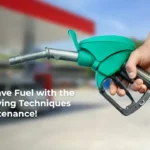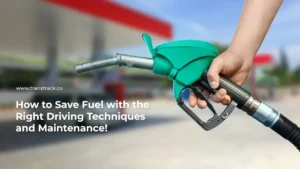Know the 19 Main Components of a Car Starter Dynamo!
Posted on June 21, 2024 by Nur Wachda Mihmidati

The car starter dynamo is one of the important components in a car’s electrical system that functions to start the engine. Without a properly functioning starter dynamo, the process of starting the engine will be difficult or even impossible. The starter dynamo works by converting electrical energy from the battery into mechanical energy to turn the engine, enabling the initial combustion process in the cylinders. In this article TransTRACK, we will discuss the various main components of a car starter dynamo, how each component works, and their important role in ensuring your vehicle is always ready to go. Understanding the function and workings of each of these components can help you in maintaining and repairing the starter dynamo, as well as preventing bigger problems in the future.
Main Components of a Car Starter Dynamo
The main components of a car starter dynamo include:
Starter Solenoid
The starter solenoid is a key component that serves to activate the car starter and connect the pinion gear with the flywheel. When the ignition is turned on, electric current from the battery flows into the solenoid, creating a magnetic field that pulls the plunger inward. This plunger then pushes the drive lever, which moves the pinion gear forward to engage the flywheel. In addition, the solenoid also closes the electrical circuit that provides full power to the starter motor, allowing the motor to rotate and turn the engine.
Brushes
Brushes are components made of carbon and function to conduct electric current from the power source (battery) to the rotating commutator. The brushes press directly onto the commutator and allow the electric current to flow to the armature coil. Over time, the brushes will experience wear and tear and need to be replaced to ensure a consistent and efficient flow of electricity to the starter motor.
Drive Gear (Pinion Gear)
The drive gear, or more commonly known as the pinion gear, is the component that connects the starter motor to the engine flywheel. When the solenoid is activated, the pinion gear is moved forward to engage the teeth on the flywheel. As the starter motor rotates, the pinion gear turns the flywheel, which then turns the engine crankshaft to start the combustion process in the cylinders.
Field Coils or Stator
Field coils, also known as stators, are coils of wire that generate a magnetic field when an electric current flows through them. This magnetic field is required to rotate the armature coil. In shunt and series type starter motors, field coils work on the principle of electromagnetism to convert electrical energy into mechanical energy that rotates the armature.
Magnetic Switch
The magnetic switch is an electromagnetic switch that controls the flow of electric current to the starter motor. When the ignition is turned on, the magnetic switch activates the solenoid that drives the pinion gear and closes the main circuit that sends electric current from the battery to the starter motor. This ensures that the starter motor only receives power when required to start the engine.
Armature Coil
The armature coil is the rotating part inside the starter motor. This wire coil is placed on an iron core and when electric current flows through it, the magnetic field generated by the field coils makes the armature rotate. This armature rotation then transfers mechanical power to the pinion gear to rotate the engine flywheel.
Commutator
Commutator is a cylindrical component made of copper segments, mounted on the armature shaft. Its function is to change the direction of the electric current in the armature coil every half turn, so that the resulting magnetic field continues to push the armature to rotate in one direction. Brushes interact directly with the commutator to deliver electric current to the armature.
Motor Housing
The motor housing is a protective structure that covers and protects all the internal components of the starter motor. Made of a strong material, usually metal, the housing also serves as a mounting place for the various parts of the starter motor and ensures all components remain in the correct position during operation.
Driven Pinion
Driven pinion is the part of the pinion gear that is driven by the starter motor to connect and rotate the flywheel. When the starter motor is engaged, the driven pinion advances and meshes with the flywheel teeth, transferring power from the starter motor to the engine to start the combustion process.
Plunger
The plunger is the moving part inside the starter solenoid. When the solenoid is activated, the magnetic field pulls the plunger inward, which then moves the drive lever to push the pinion gear towards the flywheel. The plunger also helps close the electrical contacts that send current to the starter motor.
Caps
Caps are covers that protect the armature ends and other internal components from dust, dirt, and moisture. In addition, caps also help hold the brushes in place and ensure good contact with the commutator.
Drive Lever
The drive lever is the lever that connects the plunger to the pinion gear. When the plunger is pulled inward by the solenoid, the drive lever moves the pinion gear forward to engage the flywheel. After the engine starts, the drive lever retracts the pinion gear back to its original position.
Overrunning Clutch
The overrunning clutch is a mechanism that allows the pinion gear to rotate freely after the engine starts, preventing damage to the starter motor. It works by breaking the connection between the pinion gear and the starter motor once the flywheel starts spinning faster than the pinion gear.
Yoke
The yoke is the structural part that supports the field coils and armature. It provides a strong and stable framework for all electromagnetic components in the starter motor, ensuring that the magnetic field generated is effective in rotating the armature.
Pole
Poles are parts of field coils that help focus the magnetic field onto the armature. Usually made of iron or steel, these poles increase the efficiency of the magnetic field and help in generating the torque required to rotate the machine.
Rotor & Gear
The rotor is the rotating part inside the starter motor, consisting of the armature coil and commutator. The gear connected to the rotor is the pinion gear, which connects the starter motor to the engine flywheel. The rotor converts electrical energy into mechanical energy that rotates the gear.
Flywheel
The flywheel is a large component connected to the engine’s crankshaft. As the pinion gear of the starter motor interacts with the flywheel, the power from the starter motor transfers to the crankshaft, starting the combustion cycle in the engine.
Motor Drive
The motor drive is the mechanism in a motor starter that drives all the mechanical components to rotate the engine. This includes the armature, commutator, and pinion gear, working together to generate the required rotational power.
Battery
The battery is the main source of electrical power that provides current to the starter motor. Without a strong enough battery, the starter motor will not be able to generate the magnetic field needed to turn the engine. The battery also provides power to other electrical systems in the vehicle.
Maintaining the performance and reliability of your car starter dynamo is essential to ensure your vehicle is always ready to use at any time. Understanding each major component and its function can help you with maintenance and early detection of problems. However, to make your vehicle maintenance more organized and effective, using an advanced vehicle maintenance management system can be the best solution.
TransTRACK provides Vehicle Maintenance System designed to help you manage your vehicle maintenance more efficiently. With comprehensive and easy-to-use features, TransTRACK can help you schedule routine maintenance, monitor the condition of vital components, and avoid sudden breakdowns. Don’t let a small problem with the car starter dynamo disrupt your activities.
Immediately improve your vehicle maintenance with the Vehicle Maintenance System from TransTRACK and enjoy a safer and more comfortable journey! Visit our website for more information and schedule a product demo today!
Topic :
 Bahasa Indonesia
Bahasa Indonesia








